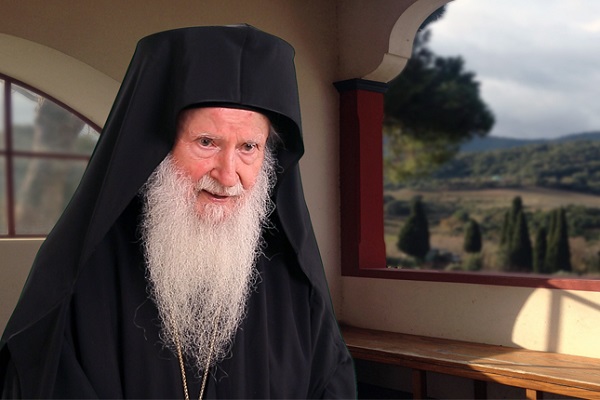Sermon for the Apostolic reading on the 3rd Sunday of Luke (2nd Corinthians 11:31-12:9) (Metropolitan of Pisidia Sotirios)
8 Οκτωβρίου 2018
In today’s passage, from the Apostle Paul’s Second Epistle to the Corinthians, a very unique experience is revealed. This was something that had never happened to anyone before! What was this experience? It was this: The Apostle Paul ascended to the third heaven, over all creation, and reached the spiritual realm in Paradise. He heard so much adoration in Heaven, but he could describe none of it to the people!

The Apostle of Christ was in no hurry to announce this to the world. He kept it secret for fourteen years! Perhaps he never would have spoken of it, if his love for the Christians in Corinth had not compelled him to support them in the faith. What had happened? We know that the Apostle Paul on his Second Apostolic journey had proclaimed the Gospel to the people of Corinth and founded a Christian Church there, despite many obstacles. Later on, various enemies of the Church were trying to persuade Christians there that what the Apostle Paul had taught them was wrong. They argued that Paul was not one of the original Twelve Apostles of Christ, and as a result what he teaches are his own personal views! This created great turmoil in the Church of Corinth. The authority of Paul’s Apostolic office was broken, which divided the Church and shook their faith. This is why the Apostle Paul, after his first Letter, was forced to send a second one to the Corinthians not long after, supporting them in the truths he had preached to them. To help them understand that he was favored by God in this sacred work, he tells them about his experience of being lifted to Paradise. He was very humble in speaking of this, acting as if he saw it happen to someone else! He worried that, if the Christians listening to him realized that it was he who went to Paradise and returned alive, they might believe him to be more than what he is. This had happened to him before, on his first tour. After the Apostle performed a miracle in Lystra (in Asia Minor), the people believed him to be a god and the pagan priest of the city was prepared to sacrifice bulls, as they did at the time. That is why the Apostle pays close attention to how the Corinthians view him. He states that he avoids boasting about any great revelations, “lest anyone should think of me above what he sees me to be or hears from me” (12:6). Finally, with words that show his compassion in revealing his secret, he writes: “I have become a fool in boasting; you have compelled me” (12:11).
By word and example, as in all things, the Apostle Paul models a true disciple of Christ. This is also shown by discernment and humility. People easily brag about even little successes. They often exaggerate their achievements to attract the admiration of others. They are ignorant of this wisdom: “Let your neighbor praise you, and not your own mouth” (Proverbs 27:2). Worse still, is to be full of pride about spiritual achievements such as talking about a miraculous cure, and instead of thanking and praising God, they attribute the cure to their own faith and effective prayer to attract people’s praise. A supposed great man who wants to be a miraculous Christian! Of course, miracles happen in the Church, but everything must be attributed to the love and power of God who does them, and to God the glory, not to men. The Apostle Paul did infinite miracles, ascended to Paradise, and boasted of nothing. The same was done by the other Apostles. The Apostle Peter met a certain man, lame from birth, and said to him: “In the name of Jesus Christ rise up and walk…and immediately his feet and ankle bones received strength. So he, leaping up, stood and walked…the people were filled with wonder…so when Peter saw it, he responded to the people: “Men of Israel, why look so intently to us as though by our own power or godliness we had made this man walk? “The faith which comes through Him -Jesus- has given him this perfect soundness in the presence of you all” (Acts 3:12).
It is remarkable that the Apostle Paul does not behave with pride, as he was honored by God to ascend to Paradise. What does he actually boast about? His suffering, his illnesses, the persecutions he suffered for the sake of Christ, and the thorn that tortured his body. He writes in the last verse of today’s passage: “Most gladly I will rather boast in my infirmities, that the power of Christ may rest upon me” (verse 9).
My brothers and sisters, the Apostle Paul, thanks to this humility and obedience to the will of God, has greatly borne the power and the grace of God. Let’s try to imitate him.





